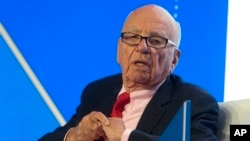Worldwide media magnate Rupert Murdoch is on the hunt to add to his corporate empire in the United States, as American media companies seek assets to gain an advantage over competitors.
Murdoch already controls movie studio 21st Century Fox, the widely watched Fox television channels and a prominent business newspaper, The Wall Street Journal. But media rival, Time Warner, balked this week at Murdoch's $80 billion offer to take over its movie studio, the popular HBO and Turner cable entertainment ventures and CNN, a worldwide news channel.
Time Warner said it "was not in the best interests" of the company to accept the deal or talk about it further with Murdoch.
But business and legal analyst Erik Gordon at the University of Michigan told VOA that Murdoch was facing a rapidly changing media landscape that could push him to increase his offer in hopes Time Warner might change its mind.
He said the planned mergers of cable distributors -- Comcast with Time Warner Cable and AT&T with the DirecTV satellite company -- would give them an advantage in multi-billion-dollar negotiations with media content producers like Murdoch and Time Warner.
With that in mind, Gordon said Murdoch was forced to become bigger if he wanted more clout.
"So you get into one of these sort of arms races, where one side gets more power, and then the other side has to consolidate to rebalance that power.... He wants to be able to go to the negotiating table against the distributors and say, well, look, if you don't deal with me on terms that are acceptable to me, not only do you lose my present properties like Fox, but you also lose HBO and Cartoon Network and everything else I get by taking over Time Warner," he said.
The dean of the business school at Hofstra University in New York, Patrick Socci, told VOA that for Murdoch, the acquisition of Time Warner's movie production division, along with HBO and its widely watched television dramas, could be reason enough to increase his bid beyond the $85 a share of stock he offered.
"I think right now at $85, Murdoch will be able to swing the deal and he's scaring everybody away by saying he may even go higher if Time Warner will open its books. And I could see that investors would probably push to make that happen, just to see how much more they could get," said Socci.
Murdoch, who generally supports conservative political causes in the U.S., said he would sell CNN if he acquired Time Warner, to avoid a conflict with his Fox News channel, where conservative commentators pointedly voice their opposition to U.S. President Barack Obama and his policies.
Gordon said that beyond the fight between corporate titans like Murdoch and Time Warner, there were other major U.S. companies seeking to win over more customers for the media content they were producing.
"You have a lot of the newer, more start-up channels -- Netflix, Amazon, Google -- getting into the business. So you sort of have two tiers. You have the huge elephants fighting each other in one room, and then you have the littler, newer guys outside the room who'll probably be their competition in coming years," he said.




